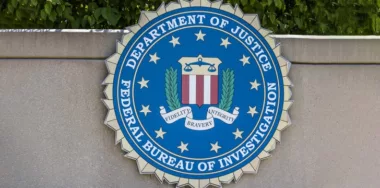Binance’s U.S. lobbying spending didn’t immunize itself from its legal woes, and more difficulties could arise following revelations that the exchange tipped off its VIP customers months before its record $4.3 billion settlement.
New reporting by the OpenSecrets campaign finance transparency group shows blockchain firms spent record sums on lobbying the U.S. federal government over the first nine months of 2023. As of September 30, total spending by blockchain-focused firms came in just shy of $19 million, nearly $3 million higher than at the same point last year, despite 2022’s biggest spender (Sam Bankman-Fried) now completely out of the picture.
As it did last year, the Coinbase (NASDAQ: COIN) digital asset exchange led the pack with a $2.16 million lobbying tab, with Foris DAX (parent of Crypto.com) in second place with $1.53 million and the Blockchain Association third with $1.47 million. Binance Holdings spent $850,000, while its Binance.US offshoot added $340,000 for a nearly $1.2 million total (that ratio was reversed in 2022). The U.S.-licensed exchange Kraken spent a very superstitious $888,000.
Since Coinbase, Binance, and Kraken were all hit with Securities and Exchange Commission (SEC) civil complaints this year (Kraken twice) and Congress failed to pass any new ‘crypto’ legislation, one might consider their lobbying spending to be a bad investment. One could also make that argument for the sector as a whole, given a new report on how much attention ‘crypto’ got from the Internal Revenue Service (IRS) this year.
In its 2023 annual report, the IRS Criminal Investigation Unit (IRS:CI) notes that while most digital asset use is kosher, it can “pose a risk of facilitating money laundering, cybercrime and ransomware, narcotics, human trafficking, terrorism, proliferation financing, and tax crimes.”
The IRS:CI is increasingly focused on “unreported income resulting from failure to report capital gains from the sale of cryptocurrency, income earned from mining cryptocurrency, or income received in the form of cryptocurrency, such as wages, rental income, and gambling winnings. CI is also seeing evasion of payment violations, where the taxpayer fails to disclose ownership of cryptocurrency in an attempt to shield holdings.”
The report also states that “ransomware, malware, banking trojans, mineware and crimeware, skyrocketed after cryptocurrency was created.” Not content to stop there, the report adds that “defendants in more than 100 cases were prosecuted for selling tens-of-thousands of counterfeit oxycodone pills containing fentanyl, in exchange for cryptocurrency via darknet marketplaces.”
For the above reasons, IRS:CI joined forces this summer with other federal agencies to create the Darknet Marketplace and Digital Currency Crimes Task Force.
Behind the scenes of the Binance settlement
The IRS was one of the U.S. federal agencies involved in last month’s $4.3 billion settlement with Binance and its founder, Changpeng ‘CZ’ Zhao. Since that settlement was reached, new details have emerged regarding how long Binance/CZ had been negotiating their fate, as well as with whom Binance was sharing that material non-public information.
Bloomberg recently revealed that a potential settlement between Binance/CZ and the Department of Justice (DoJ) fell through earlier this year because some DoJ officials felt that CZ deserved to face harsher personal consequences than those being negotiated at the time.
CZ had reportedly been discussing his plans to step down as Binance CEO on company leadership calls since at least May. That was around when reports surfaced that Binance was grooming Richard Teng, its then-head of regional markets, to be CZ’s successor.
CZ appears to have realized the jig was up once U.S. authorities obtained internal Binance communications demonstrating CZ’s full awareness of the exchange’s disdain for regulatory compliance. Long before these internal comms were obtained, IRS:CI cyber director Jarod Koopman said Binance’s name seemed to “pop up” during investigations of darknet marketplaces and dark web child exploitation markets. These latter probes may have influenced those DoJ officials who wanted to see CZ behind bars rather than simply pay a fine and walk away.
The Wall Street Journal reported that Binance’s hand was forced after the DoJ threatened to indict both Binance and CZ if they refused to plead guilty. Binance reportedly feared a tsunami of customer withdrawals following news of a criminal indictment with no settlement on the horizon, which could have sent Binance following FTX down the bankruptcy hole.
The U.S. Treasury Department also “threatened to name Binance as a primary money-laundering concern, which would have effectively cut it off from the U.S. financial system.” Treasury recently imposed that same designation on ‘coin mixers’ designed to obfuscate transaction history.
Back in the UAE
As for what prompted CZ to make his fateful flight to face the music in a Washington State federal courthouse, Bloomberg noted that CZ has been making his home in Dubai for some time and Zhao’s name “frequently came up in conversations between the US and UAE officials.”
While Bloomberg’s sources claimed that UAE authorities “didn’t play a role in Zhao’s decision” to fly to the U.S., the UAE desperately wants to get its name off the Financial Action Task Force’s (FATF) ‘grey list’ when the list is reviewed in February 2024. Dubai’s Virtual Assets Regulatory Authority (VARA), which granted Binance an Operational [Minimal Viable Product] License this summer, has yet to award the exchange a Full Market Product License, and VARA may be waiting to see how the FATF responds to Binance’s U.S. settlement.
That FATF review will occur around the same time CZ is due to appear in court to learn how long he’ll stay behind bars. U.S. District Judge Richard Jones is still mulling whether CZ will be released on bail and allowed to return to his family in the UAE or required to remain in the U.S. until the sentence is passed.
Non-public material information for everyone!
Bloomberg also reported that “a few dozen or so” of Binance’s “market makers dubbed VIPs,” were invited to a private dinner at a members-only club in Singapore in mid-September. While CZ wasn’t in attendance, Binance representatives reportedly discussed both the size of their potential U.S. financial penalty and whether Binance could survive such a blow.
The VIPs reportedly left the meeting optimistic about Binance’s ability to carry on as a going concern, regardless of CZ’s fate. A Binance spokesperson told Bloomberg that the depiction of the event was ‘inaccurate’ without specifying which aspects were in dispute.
Coincidentally (or not), the timing of this Singapore soirée—reportedly on the sidelines of the Asia Crypto Week shindig—dovetails perfectly with the minting of another $1 billion worth of the Tether (USDT) stablecoin on September 19. Since then, a further $6 billion USDT has been minted, and the value of the BTC token has soared from below $27,000 on September 18 to nearly $44,000 this week.
Despite Binance’s recent dalliances with other stablecoins such as FDUSD—the market cap of which has nearly tripled in the past three months—Binance remains the exchange on which most USDT trades occur, with the USDT-BTC pair leading the pack.
SEC still hot on the trail
The WSJ also offered some insights into why Binance continues to fight the SEC, which wasn’t a party to last month’s blockbuster settlement. At least some of Binance’s resistance to settling its SEC civil complaint is reportedly based on a ‘we’re all in this together’ vibe regarding the other exchanges (Coinbase, Kraken, etc.) who have tangled with the SEC over their sale of unregistered securities to the public.
Basically, since selling utility-free’ alt coins’ is everybody’s bread-and-butter, surrendering to the SEC’s demand to stop selling them would effectively doom U.S.-facing exchanges (including Binance.US). Similarly, the SEC wants Binance to curtail the use of its in-house BNB token, another apparent red line that Binance has no interest in crossing.
Teng talks
Teng, who reportedly was at that Singapore market maker dinner, has been working overtime to spread the news that there’s a new sheriff in town and that things will be very different at Binance from hereon in. (No kidding; the U.S. settlement requires Binance to open its books to an independent transaction monitor for the next five years.)
During a video appearance at the Financial Times Crypto Winter Summit on Tuesday, Teng proved somewhat uneager to give moderator Scott Chipolina the answers he was seeking on questions such as where Binance’s headquarters was located, whether Binance would undergo a proper third-party audit and if Binance would apply for a U.K. operating license.
Teng had a somewhat easier time last Friday during an Ask Me Anything session on X/Twitter. Teng sought to reassure customers about Binance’s financial health following its multi-billion settlement (which is to be paid over a period of 15 months). Teng insisted that “fines of this magnitude are not uncommon in the financial sector” and that Binance was “in very strong financial shape.”
Teng acknowledged that “compliance controls were lacking” during Binance’s meteoric rise to the top of the digital asset exchange charts. Teng added that “the direction of travel is clear: we are going to see more regulations in crypto,” and Teng was “committed to promoting” regulatory clarity.
Asked how the new and improved Binance will handle new token listings, Teng called listing “something we take very seriously,” then outlined several considerations, including “use cases, community engagement, whether the project is building for the future, etc.” Teng stated, “We want to work with exciting projects that support the community through their use cases.”
If Teng really is serious about Binance turning over a new leaf, re-listing BSV would be a good place to start. CZ infamously delisted BSV in April 2019, based in part on his antagonism towards Dr. Craig Wright and the BSV blockchain’s launch, causing a fall in the price of the BTC token.
Binance’s move was swiftly followed in coordination with other exchanges, creating difficulties for consumers seeking BSV. This combined anti-competitive effort led to a nearly £10 billion class action suit filed last year on behalf of BSV token holders against the exchanges in question.
With CZ out of the picture, Teng has a chance to right this historical wrong. Based on his listing criteria, the utility-focused BSV seems to tick all those boxes. What say you, Richard?
Follow CoinGeek’s Crypto Crime Cartel series, which delves into the stream of groups—from BitMEX to Binance, Bitcoin.com, Blockstream, ShapeShift, Coinbase, Ripple, Ethereum,
FTX and Tether—who have co-opted the digital asset revolution and turned the industry into a minefield for naïve (and even experienced) players in the market.
New to blockchain? Check out CoinGeek’s Blockchain for Beginners section, the ultimate resource guide to learn more about blockchain technology.








